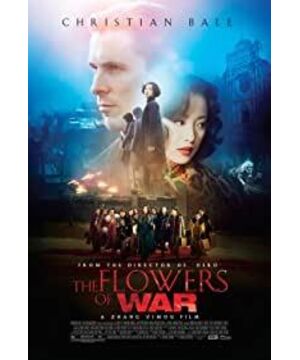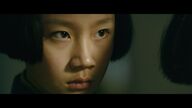The paradox is that, from Zhang Yimou to Feng Xiaogang, this generation of male directors does not have a good reputation in terms of feminism and feminist awareness. Zhang Yimou brought out a breast like a big steamed bun in "The Golden Armor of the City", Feng Xiaogang coveted the beautiful legs of the art troupe, and the beauty of women was materialized and symbolized in their eyes, reduced to a sexual symbol. This is obviously not a civilized female consciousness. But they both love Yan Geling, who is known for her feminism. There must be a misunderstanding here, either, we have misunderstood the status quo of feminism in China, or we have misunderstood Yan Geling.
This article leans towards the latter.
My negative perception of Yan Geling started from "The Thirteen Hairpins of Jinling". A film about the pain of the Chinese people, coupled with the style of the cheongsam beauties, it is difficult not to touch people, and the audience dedicated enough moved and tears. But "The Thirteen Hairpins of Jinling" made me physically uncomfortable, and I couldn't watch it any longer. This discomfort is too subtle, contrary to the usual Chinese drama expressions.
"The Thirteen Hairpins of Jinling" is a good sociological theme, about how people's sense of morality is shaped and influenced step by step. If you ask the public intuitively: In the war, if you have the right to vote, do you agree that prostitutes should replace good family women as comfort women? I am still optimistic that many people will refuse without hesitation, "No, prostitutes are also human beings, they are all victims, and they should not be discriminated against and bullied." Then, keep adding moral chips. What if this group of prostitutes were very coquettish and unpatriotic? (Pushing them to be comfort women was a punishment.) What if these good women were still innocent virgins? (Prostitutes are at least experienced to minimize harm.) What if these good girls were all students and children? (Prostitutes may be willing to save them...) There is always a link to make you agree completely, emotionally and ethically, "Yes, of course prostitutes should stand up".
This is Yan Geling's narrative trap, where the tears of "The Thirteen Hairpins of Jinling" lie. The jade and ink went through the dust, and finally volunteered to comfort the underage girl (actually to death). The director filmed the process of their death radiantly. The jade and ink people took off the cheongsam of symbolic temptation, put on pure student clothes, washed away the lead, and their faces were sunny, indicating that they finally returned to the pure era. Death is not only a moral sublimation for them, but also a moral cleansing. Because prostitutes are "dirty", wearing school uniforms before dying means dying "clean". The story induces the audience to feel that this is "moving China". The audience wiped their tears and sent them to the devil's den, and wrote in the film critics that "prostitutes also have patriotic feelings of bravery". And this group, which was originally "insulted and damaged", was put on the moral high ground in the movie. Does this help the audience to really look at them equally? Just think about it, if the jade and ink people refuse, it means that although we are prostitutes, we cannot take comfort for granted. In the end, the innocent little schoolgirl was caught in the tiger's mouth - who would you be angry with? In fact, the film also left a gap, and at the last moment, a prostitute repented, crying that she didn't want to die, but it was no use, she was killed by the collective will and was forcibly dragged away. When the audience saw this passage, how many people would think that she should be allowed to live? How many people resent her "selfishness"?
This is not a documentary, this is a story. All the dramatic conflicts are deliberately created by the author, which also presents the author's own value orientation. Some people say that he only sees adults saving children in movies, and only people with dirty hearts see prostitutes and virgins. This is really selective blindness. The prostitute saves the wind and dust, from the businesswoman who does not know the country's hatred to the righteous death, this is the biggest selling point of the story. If the protagonist were replaced by a group of equally "innocent" female teachers, the sacrifice would suddenly lose the drama that made the viewers twitch, but instead became cruel and heavy. In fact, Zhang Yimou aimed the camera at the bright cheongsams, curvy buttocks, and swaying charming postures of the jade inks. The logic was the same as Feng Xiaogang's shooting of the jade legs of the girls in the art troupe, and he was consuming the sexual characteristics of women.
The jade and ink are great and moving, but this moral stalwart is based on the author's own unequal perspective. Why do prostitutes need to sacrifice in order to be cleansed and atonement? Maupassant answered the question that Yan Geling could not answer. "Ball of Suet" is also a created story. The prostitute Ball of Suet doesn't even need to die, she just needs to travel light and satisfy the sexual needs of the enemy officers, and she can save the carload. But she tried to refuse because she had basic human dignity and didn't think her body was degraded by being a prostitute. In the end, she reluctantly gave in, she saved people, but what she gained was still the contempt of everyone. Maupassant's story is moving because of his equality and the whipping of the sense of non-equality in the human mind. Should prostitutes give their lives? Does devotion demonstrate their high morals? Obviously, Yan Geling went the other way.
And this road is precisely what Chinese people love, a model of "moving China". I have seen a TV series called "The Woman of the Swordsman Family", I thought it was the story of Yan Geling, but who knew it wasn't. An ancient family abides by the clan rules, and innocent women can enter the ancestral hall. The husband of the second woman gambled money and used her as a bargaining chip to lose to the enemy. The family sent someone to rescue her, and found that she had been raped by the enemy, "not clear", so she turned around and left. The first female was robbed to fill the house for the second female husband. This should have been a tragic history of persecution of women in the feudal era, but the direction of the story turned loudly - the first woman used her love to generate electricity and moved her husband. The second girl participated in the Anti-Japanese War and became a hero. On her deathbed, she said with relief that she could enter the ancestral hall again, and she was still a "woman of the swordsman family". At the end of the play, the sons and daughters mourned their ancestors in the family cemetery and expressed their desire to inherit the tradition. This is a story that the Chinese loved in 2014, three years later than "The Thirteen Hairpins of Jinling".
Zhang Yimou also filmed "Lu Yanshi". In all honesty, the movie is good. Chen Daoming and Gong Li interpret the solid love in the absurd years, which is touching, but also makes people sigh about those cannibalistic years. But when I look back at the original work, I can't help feeling that Yan Geling is still Yan Geling. The movie subtly intercepted the second half of the original book, only filming Gong Li's watch, without the background of this marriage-arranged marriage, a feudal woman with a low level of education marrying a eldest young master who wants to study abroad, no love, and suffering. left out. After the catastrophe, Shouwang really used love to generate electricity, so that the young master finally realized the value of old-fashioned women's loyalty. What about reflection? What about criticism? Following this logic, all the sufferings of women can be resolved with their superhuman morality in the end.
The TV series "Aunt Duohe" tells a version of "The Handmaid's Tale" of the Anti-Japanese War. A Northeastern farmer rescued a Japanese girl who had not returned home after the defeat, and asked her to leave a surrogate uterus. The girl was moved by the warmth of Chinese good people, she voluntarily gave birth to a few children without any name, and lived in the family as a "little aunt". In the end, she waved her hand without taking a cloud away and returned to the homeland of her dreams. Thinking about it carefully, there is an unspeakable cruelty in this story, but in Yan Geling's pen, this is a gentle story, a poem written by Duo He, a great woman who treats fate with love.
Yan Geling's feminism seems to be inescapable of touching Chinese routines. On the surface, it is praising women's tenacity, greatness, and lofty morals. She praised a class of women, no matter how humiliated, how misfortune and injustice they endured, and finally completed the white lotus-like redemption with Virgin-like feelings. She took the initiative to create a group of such women and praised their beauty, but Yan Geling rarely reflected on the source of their tragedy.
In an interview, Yan Geling described her female consciousness -
Reporter: I feel that you treat the heroines in your writing, they are so low and small in front of their husbands, you are full of love and sympathy for them, but at the same time, you are not mean to the hero in turn , have great understanding and sympathy for them.
Geling Yan: This is true feminism, because you believe that you are stronger and more vital than him. Don't look at the explosive power of men, but women always last to the end and live longer than men. Physiologically speaking, if you look at the old ladies who survived, there are a lot of them. Tokyo is also a lot of old ladies. The average life expectancy is the highest. Japan is now 88 years old. So from the perspective of vitality, (women) are indeed very strong, so what about giving a little? Right, I don't know you in general at all, and I don't care about you. This is my feminism. In the past, people said that I was a feminist, but I didn't admit it, but now I find that I am a feminist, because I hid feminism in such an attempt, and I was already a bit taller than you. That's why I said in "Fusang": Fusang kneels, but tolerates those who stand.
Those who are kneeling and those who are tolerant, Yan Geling said this is feminism. In other words, she didn't think they should stand up and resist first. And in another interview - The
Paper: I watched Fusang and felt that she was very aggrieved and had such a kind of resignation.
Yan Geling: Do you think Gandhi is submissive? His non-cooperation is the same as Fusang's non-resistance. You can never beat someone who doesn't resist. Throughout the ages, in fact, the word "rape" has carried a heavy meaning imposed on it by many people, which contains discrimination. In contrast, the word may cause more harm. Fusang, she is right about things and not people. Including the rape, Fusang has no concept. Fusang accepts things rather than people, and it was just an unusual encounter for her. She bit off the button of her rapist, and she didn't feel anything.
This sentence looked horrifying. The non-resistance of women when they are raped (in reality, most of them are powerless to resist), through artistic creation, beautify into a Gandhi-style moral benchmark. "An unusual encounter." This is the most poetic description of rape I have ever read. Is this feminism or feminism?
It is difficult to distinguish and analyze Yan Geling's values. We are a moral power with a long history, advocating sacrifice and stalwart. Yan Geling also writes about women's thinking, women's victory, and women's beauty, but under the wrapping of a grand moral narrative, the beauty she expresses may not be natural beauty, but the abducted woman named "the most beautiful rural female teacher". the kind of beauty. That's the kind of viciousness that we should painstakingly discern and strip out of our collective consciousness.
Finally, it may be helpful to conclude with a passage from Yan Geling's own account, which may help to understand why that generation of Chinese male directors favored her. The connection of the spiritual core makes Yan Geling a spiritual archway shared by the Chinese.
"I have always said that it is necessary to judge ugliness. Powerful aesthetics are sometimes painful, but only this can achieve the greatest aesthetic pleasure. For example, binding feet, many people think this is ugly. I don't think it is a cultural phenomenon. A characteristic thing. I can give you the sweet, general beauty of a pop song, but that's not what I like and aspire to."
View more about The Flowers of War reviews









